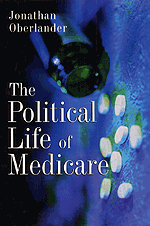How to pay for health care reform
 A CNN story today offers a reminder that “if President Obama has his way, health care reform will be finalized this year.… And while the specifics of how to fix the nation’s health care system are far from final, the debate over how to pull it off will turn on a key question: How to pay for it.”
A CNN story today offers a reminder that “if President Obama has his way, health care reform will be finalized this year.… And while the specifics of how to fix the nation’s health care system are far from final, the debate over how to pull it off will turn on a key question: How to pay for it.”
That’s precisely the question Jonathan Oberlander, author of The Political Life of Medicare, takes up in the last issue of the New England Journal of Medicine. “All the funding options,” Oberlander concludes, “contain various levels of political poison. Indeed, financing will probably have to be patched together from a combination of controversial sources.”
Explaining the costs and benefits of these sources, Oberlander investigates ideas such as increasing “sin taxes” on tobacco and alcohol, taxing some employer-paid insurance premiums, expanding health insurance coverage to cover more people, and making cuts to Medicare and Medicaid. This last option, of course, is one to which Oberlander has also written a comprehensive backstory, revealing in The Political Life of Medicare how Medicare politics and policies have developed since the program’s enactment in 1965.
And, as his NEJM piece reminds us, Oberlander’s accessible analyses continue to provide an excellent starting point for those involved with what he calls the “extraordinary challenge” of “assembling a workable financing plan” for health care reform.